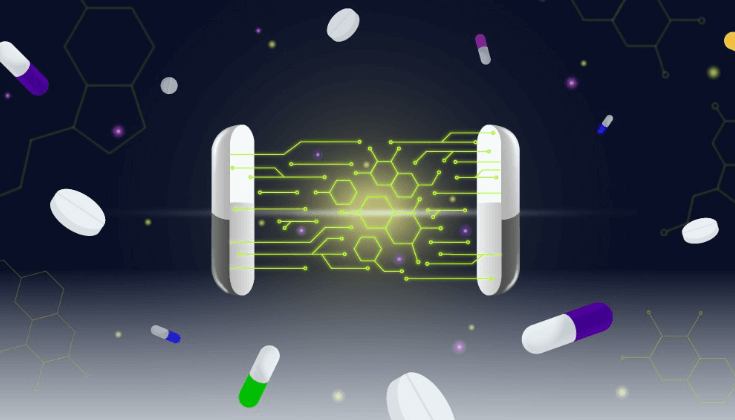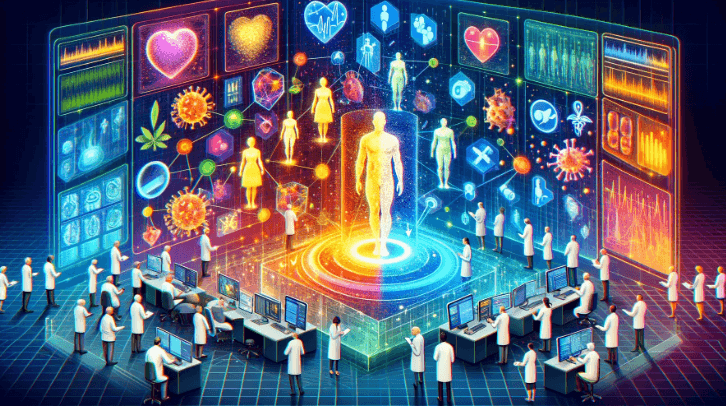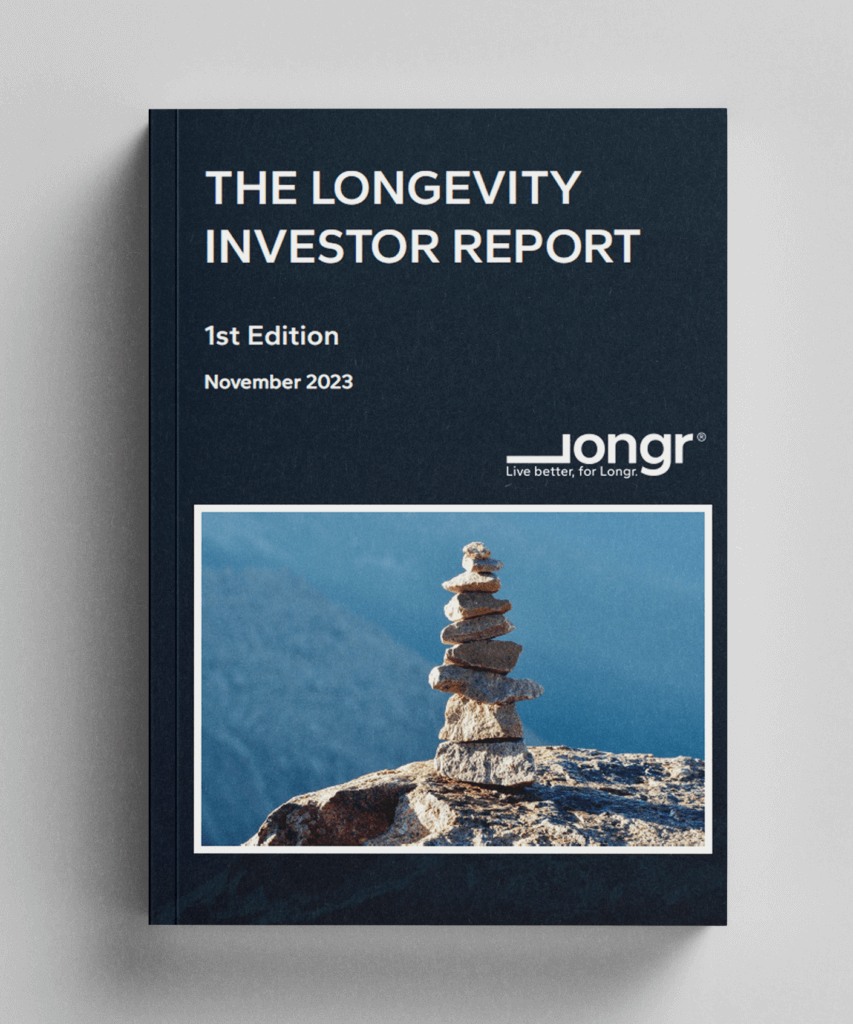The dawn of machine learning (ML) and artificial intelligence (AI) in healthcare and longevity science heralds a transformative era, promising to redefine our approach to medicine, aging, and human health. It’s crucial to recognize the profound implications of integrating AI and ML into healthcare — a journey that could lead to unprecedented advancements in longevity and quality of life.
The genesis of this transformation lies in the digital revolution, which has unleashed an avalanche of data across all sectors, most notably in healthcare and biological research. The volume of data generated by genomic sequencing, clinical trials, patient health records, and biometric sensors is staggering, yet its potential has been largely untapped due to the limitations of traditional data analysis techniques. Enter machine learning and artificial intelligence — technologies that have the power to harness this data deluge, offering insights and breakthroughs at a pace and scale previously unimaginable.
Machine learning, a subset of AI, employs algorithms that can learn from and make predictions or decisions based on data. This capability is particularly suited to the complex and data-rich field of healthcare, where ML can identify patterns and anomalies that elude human detection.
From predicting disease outbreaks and diagnosing conditions with greater accuracy to personalizing treatment plans and advancing drug discovery, the potential applications of ML in healthcare are vast and varied.
The promise of AI and ML extends beyond mere data analysis, offering tools that can simulate complex biological processes, model the outcomes of potential treatments, and even automate the design of new drugs. This not only accelerates the pace of research and development but also opens new avenues for understanding and treating diseases, particularly those related to aging. By decoding the biological mechanisms of aging, ML and AI could enable us to prevent or reverse age-related diseases, extending healthspan — the portion of life spent in good health — and ultimately, lifespan.
However, the path to realizing this potential is fraught with challenges. Ethical considerations, data privacy concerns, and the need for robust regulatory frameworks are just the tip of the iceberg. Moreover, the successful integration of AI and ML into healthcare will require a concerted effort from scientists, policymakers, healthcare providers, and technologists. It necessitates a cultural shift towards embracing data-driven decision-making and interdisciplinary collaboration, as well as significant investment in infrastructure, education, and public engagement.
Let’s dive in …

Machine Learning for Targeted Disease Treatment
This article, penned by Dr. Nicola Williams, highlights the transformative potential of ML in targeted disease treatment, underscoring its capability to sift through vast datasets to uncover patterns and insights previously beyond our reach.
The advent of big data in biology, characterized by the generation of large, complex datasets, has necessitated the use of advanced analytical methods. By mining biological data for specific patterns, ML is becoming an indispensable tool for developing targeted therapies in medicine. This approach marks a significant shift from traditional, broad-spectrum treatments to precision medicine, where treatments are tailored to the individual’s unique biological makeup.
One of the key advancements facilitated by ML is in the realm of targeted disease treatment, particularly in cancer therapy. Here, ML algorithms are employed to identify specific proteins that control cancer cells, enabling the development of drugs that target these proteins while sparing healthy cells. This targeted approach not only promises to improve the efficacy of treatments but also to reduce the side effects associated with conventional therapies.
Furthermore, ML’s capacity for handling big biological datasets is instrumental in identifying novel cancer targets. Through classification, clustering, and the use of neural networks, ML algorithms can dissect genome-wide transcription profiles, protein expression profiles, and mutational landscapes. This analysis enables highly accurate classifications of tumor subtypes, paving the way for more personalized and effective treatment strategies.
The article also delves into the applications of ML beyond cancer treatment, encompassing genome annotation, predictions of protein binding, and the characterization of transcriptional regulatory networks. These applications illustrate the broad potential of ML to revolutionize various aspects of biology and medicine, from drug development to the management of complex diseases.
Read the full article here.
THE LONGEVITY INVESTOR REPORT
This exclusive first edition has a complete sector breakdown, and an introduction to some of the key things professional longevity investors are looking at.
We’re demystifying the sector, and providing inside access to the most promising companies.

The Case for ML in Life Sciences
Authored by Fi Forrest and reviewed in June 2023, the article illuminates the burgeoning role of AI and ML in enhancing the efficiency, accuracy, and personalization of life sciences, particularly in the domains of pharmacovigilance, e-consent, and doctor-patient communications.
The life sciences industry is uniquely positioned to benefit from the advancements in AI and ML, leveraging big data to unearth patterns, trends, and associations that can significantly improve human health outcomes. The crux of AI’s impact in life sciences lies in its unparalleled pattern-matching abilities and processing speed, presenting new avenues in drug discovery, disease diagnosis, and patient care. The utilization of conversational AI platforms, like ChatGPT, exemplifies how AI can simulate human-like conversations, providing a bridge between complex medical information and patient understanding.
One of the standout applications of AI in life sciences is its integration into Electronic Medical Records (EMR) systems. These systems have evolved from mere digital versions of paper records to sophisticated platforms that offer deep AI-driven analysis, aiding clinical decision support (CDS). This evolution signifies a leap towards more informed and precise clinical decisions, enhancing patient outcomes and healthcare efficiency.
Furthermore, the article explores the pivotal role of AI in clinical trials, particularly through the use of electronic consent (eConsent) forms. eConsent represents a significant advancement in patient engagement and comprehension, making it easier for participants to understand the technical medical conditions and procedures involved in trials. This digital approach not only simplifies the consent process but also integrates seamlessly into broader digital ecosystems, streamlining clinical trial management and reducing both time and costs.
However, the article also acknowledges the challenges inherent in adopting AI and ML technologies, especially concerning data privacy, the risk of algorithmic bias, and the need for careful regulatory navigation. Despite these challenges, the potential of AI and ML to revolutionize life sciences remains undeniable, with forecasts suggesting a dramatic increase in the adoption and impact of these technologies in healthcare over the next five years.
Read the full article here.

Machine Learning Reveals Key Markers for Healthy Aging
Published in the journal Nature Aging, the study leverages ML to analyze the health trajectories of individuals over time, distinguishing between inherent aging factors and chronic disease risks. This research marks a significant stride toward personalized healthcare, focusing on preventative measures that can lead to a healthier, longer life.
By applying ML to the Clalit Healthcare Services database, encompassing medical history data of 4.57 million individuals, the study uncovers early indicators of healthy aging, such as neutrophil counts and alkaline phosphatase levels. These biomarkers offer a blueprint for interventions that could potentially extend healthspan and decouple the aging process from the onset of chronic diseases.
The study’s methodology involves developing a machine learning model that predicts clinical markers for disease-free healthy aging. This approach not only provides insights into the biological underpinnings of longevity but also challenges the traditional paradigms of aging research, which often focus solely on the treatment of age-related diseases rather than their prevention.
Moreover, the research extends its analysis to the UK Biobank and the National Health and Nutrition Examination Survey (NHANES), reinforcing the model’s validity across diverse populations. This cross-population analysis underscores the universal applicability of ML in identifying markers for healthy aging, offering hope for globally scalable interventions.
The implications of this study are profound, suggesting that ML can play a crucial role in shifting the focus of healthcare from disease treatment to prevention and health maintenance. By identifying and understanding the key markers for healthy aging, healthcare providers can develop targeted strategies to support individuals in maintaining their health and vitality well into old age.
Read the full article here.
The three articles provided offer a glimpse into the vast potential of these technologies to enhance our understanding of diseases, improve the efficiency and effectiveness of treatments, and ultimately, to extend and enrich human life. This closing analysis aims to synthesize the insights from these articles and explore their broader implications for the healthcare industry, investors, and society at large.
At the heart of this technological revolution is the ability of ML and AI to bridge the gap between the massive volumes of biological data being generated and the actionable insights needed to drive medical advancements. As seen in the exploration of targeted disease treatments, ML algorithms have the power to sift through complex biological datasets, identifying patterns and markers that can lead to the development of more effective, personalized treatments. This capacity for data-driven discovery is not only accelerating the pace of research but is also opening up new avenues for treating diseases that have long eluded conventional approaches.
The impact of AI and ML extends beyond the realm of drug discovery, permeating various facets of life sciences as highlighted in the exploration of their applications in e-consent, pharmacovigilance, and doctor-patient communications. The adoption of these technologies is streamlining clinical trials, enhancing patient engagement, and improving the accuracy and efficiency of medical translations. This comprehensive transformation underscores the versatility of AI and ML, demonstrating their potential to address a wide range of challenges across the healthcare value chain.
Perhaps most significantly, the application of ML in identifying key markers for healthy aging represents a pivotal step towards extending healthspan, not just lifespan. By distinguishing between inherent aging factors and chronic disease risks, ML is laying the groundwork for interventions that target the biological processes of aging itself. This shift towards preventative, personalized healthcare has the potential to drastically reduce the incidence of age-related diseases, improving quality of life and reducing healthcare costs.
Despite the promise these technologies hold, the road ahead is not without challenges. Ethical considerations around data privacy, the potential for algorithmic bias, and the need for robust regulatory frameworks are just a few of the hurdles that must be navigated as we integrate AI and ML more deeply into healthcare. Moreover, the success of this integration will require not only technological innovation but also a cultural shift within the healthcare industry towards embracing data-driven decision-making.
As we look to the future, the potential for AI and ML to transform healthcare is boundless. The challenge and opportunity for us all lie in harnessing this potential responsibly, ethically, and effectively, ensuring that the benefits of these technologies are realized for all.
Until next time,
The Longr Reads Team
“Intellectuals solve problems, geniuses prevent them.”
Albert Einstein
Longr Reads’ of the Week
- The Future is Advanced (Christian Angermayer)
- Longevity Investments: Opportunity of the Century (Lachezar Zanev)
- Longevity Economy Strategy (AXA Investment Managers)



